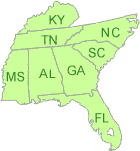CAA Permitting in EPA's Southeastern Region
EPA's Southeastern region - Region 4 - serves Alabama, Florida, Georgia, Kentucky, Mississippi, North Carolina, South Carolina, Tennessee and several tribal nations
- Region 4 OCS Permits Open for Public Comment - no permits are currently open for public comment
- Region 4 Tribal Permitting Activity - no permits are currently open for public comment
- Region 4 - Permitting Contacts by Topic
- State and Local Proposed Title V Permits Under Review and Region 4 Contacts
- State and Local PSD Activity
Focus Topics for Region 4
Permitting Authorities by State
Public Involvement
Trainings on public participation in the Clean Air Act permitting process in Region 4 are available at this site: Region 4 Air Permitting Public Involvement.
GHG Permits
Most air quality permits required by the Clean Air Act (CAA) are issued by state and local agencies. Occasionally, however, the U.S. EPA is responsible for issuing permits for sources of air pollution when states do not have authority to implement certain provisions of the CAA. EPA Region 4 was the permitting agency responsible for issuing preconstruction air quality permits for Florida facilities that emit significant quantities of greenhouse gas (GHG) emissions from approximately 2011-2014 and at that time, sources were subject to the federal Prevention of Significant Deterioration (PSD) permitting program.
Listed below is information you might find useful regarding the historic GHG PSD Permitting in Region 4 and EPA’s national GHG permitting activities:
LNG Permits
U.S. EPA Region 4 is the agency responsible for issuing Clean Air Act (CAA) permits to liquefied natural gas (LNG) deepwater ports that may be located on the Outer Continental Shelf beyond the seaward boundaries of the States of Alabama, Florida, and Mississippi. These facilities, primarily vessels, will be engaged in vaporizing imported LNG and sending it to shore through pipelines and will be located a minimum of three miles, but often much farther, from shore. If licensed, such projects will require an air quality preconstruction permit and Title V operating permit issued pursuant to the CAA and applicable regulations.
Listed below is information you might find useful regarding LNG Permitting in Region 4:
National Permit Initiative
NSR Permits
View Recent State and Local PSD Activity
Contacts
- State and Local NSR Permit Contacts
- Region 4 - Permitting Contacts by Topic, including special emphasis areas
Resources
- NSR Information (EPA official NSR website)
- NSR and PSD Policy and Guidance Index
OCS Permits
EPA Region 4 is the agency responsible for implementing and enforcing Clean Air Act (CAA) requirements for Outer Continental Shelf (OCS) sources offshore the state seaward boundaries of the States of North Carolina, South Carolina, Georgia, and Florida, which includes all areas of the Gulf of America east of 87’30” (see CAA section 328). Applicants located within 25 nautical miles of a state seaward boundary are required to comply with the air quality requirements of the nearest onshore area, including applicable permitting requirements. Applicants locating beyond 25 nautical miles from the state seaward boundary, are subject to federal air quality requirements and will likely need an OCS permit complying with the EPA’s Prevention of Significant Deterioration (PSD) preconstruction permit program (see 40 CFR 52.21), and/or Title V operating permit program requirements (see 40 CFR 71). EPA strongly recommends that potential applicants review the OCS Permitting Process below and contact EPA Region 4 to determine what requirements apply.
Listed below is information you might find useful regarding OCS Permitting in Region 4:
- Overview of Outer Continental Shelf Air Permits
- Region 4 OCS Permitting Activity
- OCS Permitting Process in Region 4
- Region 4 OCS Permit Contacts and Other Federal Agency OCS Contacts
- Region 4 OCS Permits Open for Public Comment - no permits are currently open for public comment.
- OCS References
Title V Program Evaluations
- Alabama and Local Agencies Evaluations
- Florida Evaluations
- Georgia Evaluations
- Kentucky and Local Agencies Evaluations
- Mississippi Evaluations
- North Carolina and Local Agencies Evaluations
- South Carolina Evaluations
- Tennessee and Local Agencies Evaluations
Title V Operating Permits Program
- Title V Operating Permit Policy and Guidance Document Index
- State and Local Proposed Title V Permits Under Review and Region 4 Contacts
- Overview of Operating Permits Issued under Title V of the Clean Air Act
Tribal NSR Permitting
On July 1, 2011, the EPA promulgated a final Federal Implementation Plan (FIP) that implements New Source Review (NSR) preconstruction air pollution control requirements in areas in Indian country. The FIP, which is titled "Review of New Sources and Modifications in Indian Country" includes two NSR rules for the protection of air quality in Indian country. One of those rules, known as the Minor NSR Rule, applies to new industrial facilities or modifications at existing industrial facilities with the potential to emit equal to or more than the minor NSR thresholds but less than the major NSR thresholds, generally 100 to 250 tons per year (tpy). The FIP gives EPA Region 4 the authority to review applications for and issue minor NSR permits to stationary sources on Indian country in the Region (s). The FIP also allows EPA to delegate that authority to tribes in the Region that request it and are able to demonstrate appropriate capability to implement the plan. Additionally, the FIP can be replaced by an EPA-approved tribal implementation plan (TIP).
Listed below is information you might find useful regarding Tribal Minor NSR Permitting in Region 4:
-
Region 4 Tribal NSR Contact: Lori Shepherd at 404-562-8435
There are 6 federally recognized Tribes in Region 4; none have any major sources or issue Title V permits.

